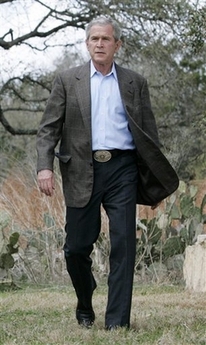Bush: Further troop cuts unknown
Updated: 2008-03-02 09:22
CRAWFORD, Texas - President Bush declined Saturday to promise more US troop withdrawals from Iraq before he leaves office, and underscored the need for a strong military presence during Iraqi provincial elections in October.
Security has improved markedly since last summer when the last of five Army brigades arrived in Iraq to complete the president's buildup of 30,000 troops. One brigade has already returned home and the four others are to leave by July. What remains unclear is whether Bush will order additional drawdowns in the final months of his presidency.
|
|
"There is going to be enormous speculation," he said. "My sole criterion is, whatever we do, it ought to be in the context of success."
The president spoke at his Texas ranch where he hosted Danish Prime Minister Anders Fogh Rasmussen for talks about NATO's complex mission in Afghanistan, climate change, Iran and other trans-Atlantic issues. They took time, though, for a two mountain bike rides at the dusty ranch at sunset Friday and again at sunrise Saturday.
"You made me work very hard out there on the terrific mountain bike trails," Fogh Rasmussen said.
Bush said the Danish prime minister did not "even break into a sweat."
At the news conference, Bush said decisions about troop cuts -- beyond those now planned through July -- would be based on recommendations from his generals. But he said there needs to be strong military support in place to ensure the viability of Iraqi provincial elections. It was an indication that more troop reductions might have to wait until after the voting in Iraq on Oct. 1.
"I think our generals ought to be concerned about making sure there's enough of a presence so that the provincial elections can be carried off in such a way that democracy advances," Bush said. "But I'll wait and hear what they have to say. But, yes, I mean, that ought to be a factor in their recommendation to me."
A senior administration official told reporters during a briefing Friday at the White House, "I fully expect there to be more reductions this year -- and so does the president." But the White House dialed back that comment on Saturday, saying that further troop reductions in Iraq where the US death toll is nearing 4,000 have not been ruled in or out.
The top US commander in Iraq, Gen. David Petraeus, is expected to recommend to Bush in April that he wait about four to six weeks -- after the troops involved in the military buildup return home -- before deciding whether any more troops could be withdrawn.
That would put off any new decision about cutbacks until August or September at the earliest, and Bush's concerns about the provincial elections in October seemed to suggest it would come even later. Bush said events surrounding the US presidential election in November would not "drive my decision."
Also on Iraq, Bush declined to criticize the Iraqi government for inviting Iranian President Mahmoud Ahmadinejad, to Baghdad on Sunday. Bush said it was normal for neighbors to visit. But he was quick to mention the U.N. Security Council's vote next week on new sanctions against Iran over its nuclear programs. And he offered a pointed message of his own to Tehran: "Stop exporting terror."
The US accuses Iran of training and supplying Shiite militia fighters with the ability to target Americans -- a charge Iran has denied. Bush said Iraqi leaders need to tell Ahmadinejad: "Quit sending in sophisticated equipment that's killing our citizens."
A chief topic of the talks between Bush and Fogh Rasmussen was the NATO mission in Afghanistan against the Taliban and al-Qaida fighters -- a topic that also will dominate the NATO summit in Romania in April.
All 26 NATO nations have troops serving there, but those fighting in southern parts of the country -- mainly Canada, Britain, the US and the Netherlands -- are upset that countries such as Germany, Italy, France and Spain restrict their forces to more peaceful regions north and west. Canada has threatened to pull out its combat troops from the south if other NATO members do not come through.
"We expect people to carry their -- to carry a heavy burden if they're going to be in Afghanistan," Bush said.
The prime minister of Denmark, which has about 600 troops in the dangerous south, said: "I feel confident that we can convince partners to contribute with more troops than today."
In his opening remarks, Fogh Rasmussen pushed for US contributions to reducing carbon emissions to slow global warming and pleaded for American leadership to persuade major countries to cut emissions. Denmark is hosting an important climate meeting in December 2009.
Privately, Fogh Rasmussen talked with Bush about Denmark's decision to investigate claims the CIA secretly used an airport on his country's remote Arctic territory of Greenland as part of the CIA's "extraordinary rendition" program for suspected terrorists. The prime minister later told Danish reporters that Bush had promised US cooperation in Denmark's inquiry about whether CIA flights violated its airspace in Greenland.
|
|
|
||
|
||
|
|
|
|
